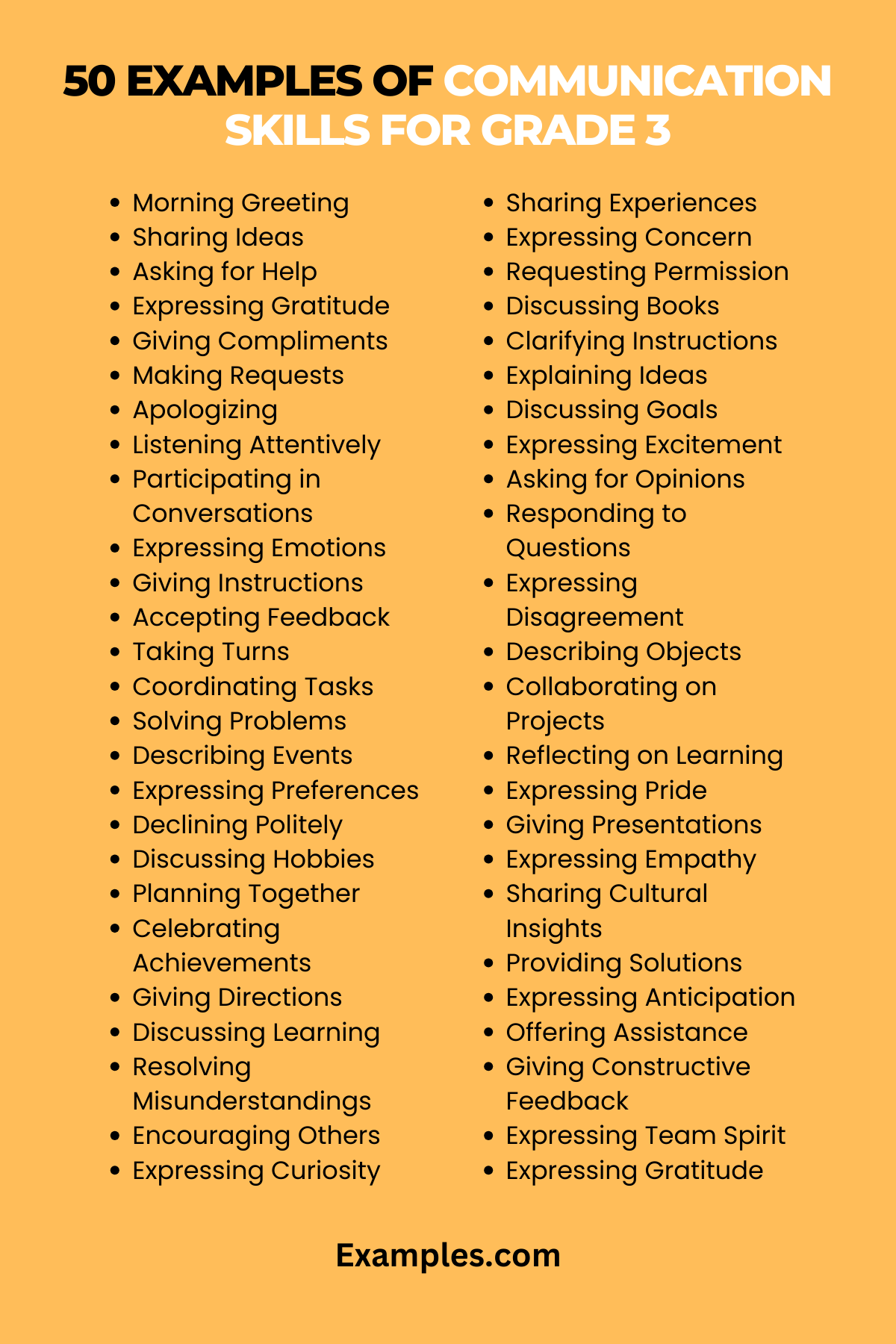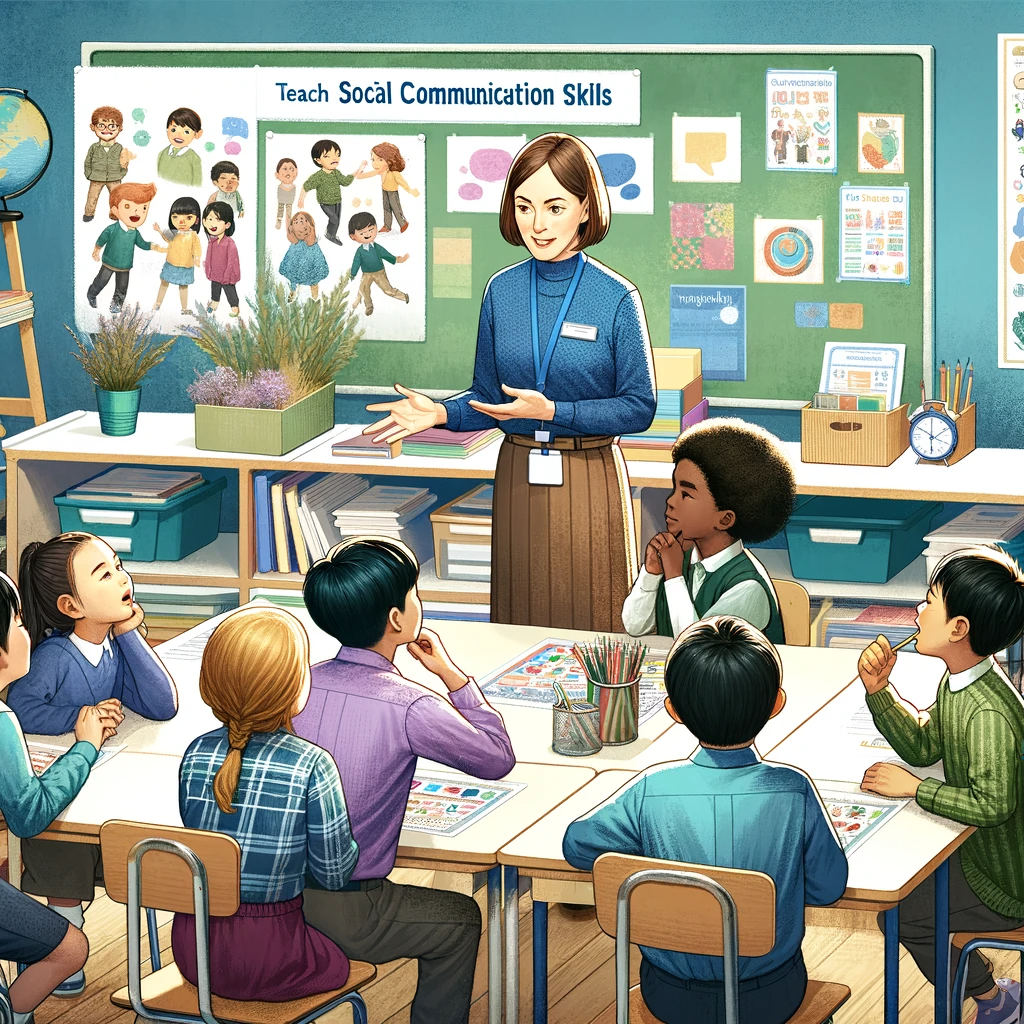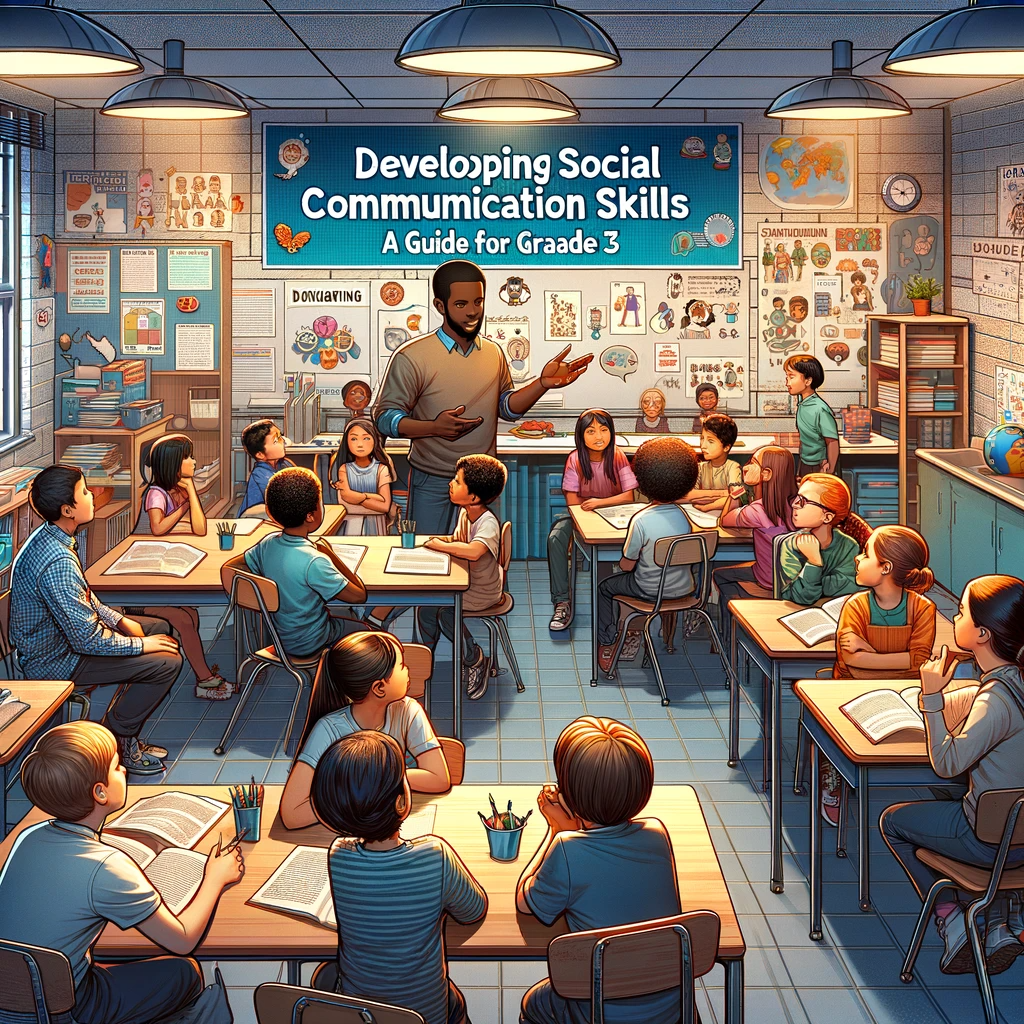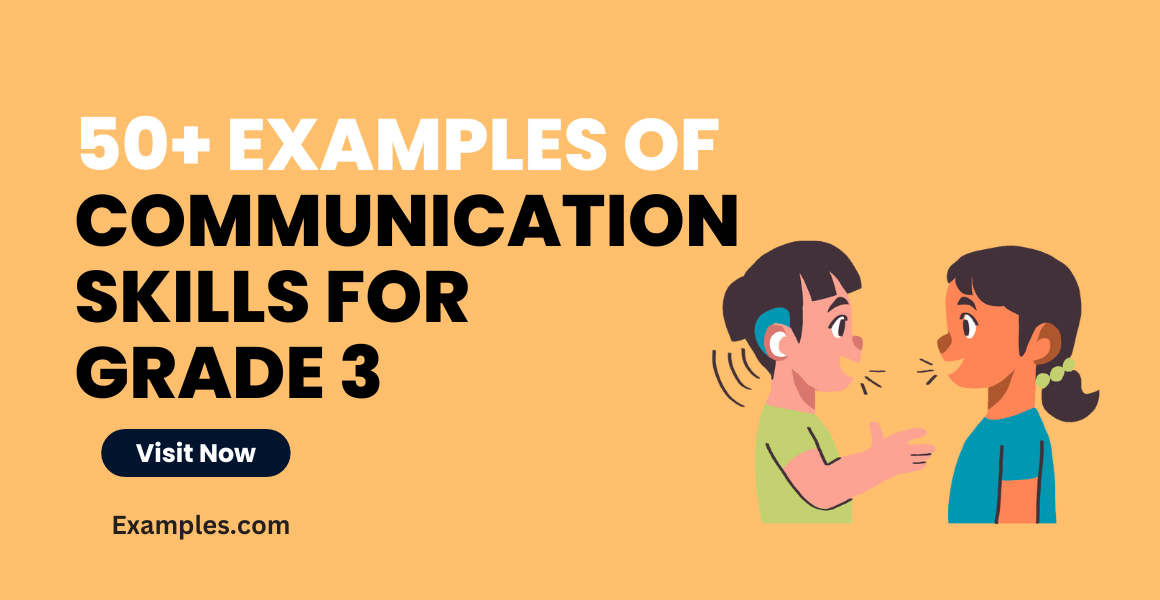Communication Skills for Grade 3
Embarking on a journey to empower Grade 3 learners, our guide unveils the essence of communication skills. Delve into the fascinating world of communication, exploring its definition, rich historical origins, diverse examples, actionable how-to guides, and essential tips. Tailored for young minds, this resource opens doors to expressive and effective communication, laying the groundwork for lifelong learning and growth.
50 Examples of Communication Skills for Grade 3
Enhancing communication skills involves mastering various scenarios, from casual conversations to formal interactions. These everyday communication examples illustrate the application of language and nonverbal cues, facilitating effective exchanges in daily life situations. Utilizing these instances for practice aids in honing language fluency, articulation, and the ability to convey thoughts succinctly and clearly.

- Morning Greeting: Boldly greet your friends and teachers every morning to create a positive start to your day.
- Sharing Ideas: Express your thoughts during class discussions, sharing your unique perspective with classmates.
- Asking for Help: Don’t hesitate to ask your teacher or peers for assistance when faced with challenging tasks.
- Expressing Gratitude: Say “thank you” when someone helps you or shows kindness—it makes a big difference!
- Giving Compliments: Brighten someone’s day by complimenting their achievements or positive qualities.
- Making Requests: Politely ask for what you need, whether it’s borrowing a pencil or seeking clarification.
- Apologizing: If you make a mistake, be ready to apologize and make amends.
- Listening Attentively: Show respect by actively listening when others are speaking.
- Participating in Conversations: Engage in conversations during group activities, contributing your thoughts and ideas.
- Expressing Emotions: Share your feelings with friends or teachers, promoting emotional intelligence.
- Giving Instructions: Practice giving clear instructions when working in teams or playing games.
- Accepting Feedback: Be open to feedback from teachers and classmates, using it to improve your skills.
- Taking Turns: Practice taking turns during discussions or group activities, promoting fairness.
- Coordinating Tasks: Work with classmates to coordinate tasks during group projects.
- Solving Problems: When conflicts arise, communicate calmly to find solutions that benefit everyone.
- Describing Events: Sharpen your storytelling skills by describing events in a clear and engaging manner.
- Expressing Preferences: Share your likes and dislikes during activities or when making choices.
- Declining Politely: Learn to say “no” in a polite way when needed, respecting your own boundaries.
- Discussing Hobbies: Talk about your hobbies and interests with enthusiasm, sparking conversations.
- Planning Together: Collaborate with classmates on planning activities or projects.
- Celebrating Achievements: Congratulate your peers on their achievements, fostering a positive atmosphere.
- Giving Directions: Practice giving and following simple directions to enhance your communication skills.
- Discussing Learning: Engage in discussions about what you’re learning, sharing insights with classmates.
- Resolving Misunderstandings: When misunderstandings occur, communicate openly to resolve them.
- Encouraging Others: Offer words of encouragement to classmates facing challenges.
- Expressing Curiosity: Ask questions to satisfy your curiosity and deepen your understanding.
- Sharing Experiences: Share personal experiences to create connections with others.
- Expressing Concern: Show empathy by expressing concern when a classmate seems upset.
- Requesting Permission: Politely ask for permission when needed, respecting rules and boundaries.
- Discussing Books: Engage in book discussions, sharing your favorite stories and characters.
- Clarifying Instructions: If instructions are unclear, ask for clarification to ensure you understand.
- Explaining Ideas: Practice explaining your thoughts and ideas clearly to others.
- Discussing Goals: Share your goals with classmates, fostering a supportive environment.
- Expressing Excitement: Show enthusiasm when discussing exciting topics or upcoming events.
- Asking for Opinions: Encourage classmates to share their opinions during discussions.
- Responding to Questions: Politely respond when others ask you questions, promoting effective dialogue.
- Expressing Disagreement: Learn to express disagreement respectfully, promoting healthy discussions.
- Describing Objects: Practice describing objects or scenes using vivid language.
- Collaborating on Projects: Work collaboratively on projects, communicating ideas with your team.
- Reflecting on Learning: Share reflections on what you’ve learned, encouraging thoughtful conversations.
- Expressing Pride: Feel proud of your achievements and express that pride to others.
- Giving Presentations: Hone your presentation skills by communicating ideas clearly to an audience.
- Expressing Empathy: Show empathy by understanding and acknowledging the feelings of others.
- Sharing Cultural Insights: Discuss your cultural background, enriching class discussions with diverse perspectives.
- Providing Solutions: When faced with challenges, propose constructive solutions during discussions.
- Expressing Anticipation: Share your excitement about upcoming events or activities.
- Offering Assistance: Be ready to help classmates when they face challenges, fostering a supportive environment.
- Giving Constructive Feedback: Provide constructive feedback to peers, helping them improve their work.
- Expressing Team Spirit: Encourage teamwork by communicating effectively with your peers during group activities.
- Expressing Gratitude: Show appreciation by saying “thank you” when someone helps you or does something kind.
Teaching Social Communication Skills for Grade 3
In fostering communication skills for Grade 3 students, the emphasis extends beyond verbal expression. This guide explores holistic methods to teach social communication effectively. Incorporating activities and interactive learning, educators can enhance students’ abilities to express thoughts, understand emotions, and collaborate with peers.

Strategies for Teaching Social Communication Skills
- Interactive Games: Engage students in games promoting teamwork, encouraging them to communicate effectively in a fun setting.
- Role-Playing: Foster creativity through role-playing scenarios, aiding students in understanding various social situations.
- Storytelling Sessions: Encourage students to share stories, enhancing verbal communication while promoting active listening.
Practical Tips for Educators
- Inclusive Learning: Tailor lessons to accommodate diverse communication styles, ensuring every student feels heard.
- Positive Reinforcement: Acknowledge and reward effective communication, reinforcing positive behavior.
- Encourage Empathy: Cultivate a classroom environment that values empathy, teaching students to understand and respond to others’ emotions.
Assessing Progress in Grade 3 Communication Skills
- Observational Assessments: Regularly observe students’ interactions to gauge improvements in communication.
- Peer Evaluations: Integrate peer assessments to promote self-awareness and constructive feedback among students.
- Parent-Teacher Collaboration: Foster communication with parents to share insights on a student’s social development.
Developing Social Communication Skills A Guide for Grade 3
Navigating the complexities of social communication is essential for Grade 3 students. This guide outlines a comprehensive approach to developing these skills, encompassing verbal, nonverbal, and written communication.

Holistic Learning Approaches
- Incorporating Arts: Integrate art-based activities to stimulate creativity, enhancing nonverbal expression.
- Collaborative Projects: Assign group projects to encourage teamwork, fostering effective communication among peers.
- Writing Exercises: Develop written communication by incorporating short essays, fostering expression and clarity.
Nurturing Emotional Intelligence
- Emotion Recognition: Implement activities to help students recognize and express emotions accurately.
- Conflict Resolution: Teach effective conflict resolution, empowering students to navigate social challenges constructively.
- Mindfulness Practices: Introduce mindfulness exercises to promote self-awareness and emotional regulation.
Tailoring Education to Individual Needs
- Differentiated Instruction: Recognize and address diverse learning styles, ensuring personalized approaches for each student.
- Continuous Feedback: Provide consistent feedback to guide students in refining their communication skills.
- Goal Setting: Collaborate with students to set communication-related goals, fostering a sense of achievement.
How Do I Teach My Grade 3 Child Good Communication Skills?
Teaching communication skills to Grade 3 children is a rewarding endeavor that lays the foundation for their future interactions. Employ these strategies to foster effective communication in young learners.
1. Interactive Storytelling:
Encourage storytelling sessions where children can express themselves creatively. This boosts verbal communication skills and captivates their imagination.
2. Role-Playing Activities:
Integrate role-playing scenarios that mirror everyday situations. This not only enhances verbal communication but also promotes understanding of diverse social interactions.
3. Artistic Expression:
Embrace artistic activities, such as drawing or crafting, to encourage nonverbal communication. This helps children express thoughts and feelings through different mediums.
4. Group Projects:
Assign collaborative projects to instill teamwork. Group activities foster effective communication as children learn to share ideas and work cohesively.
5. Positive Reinforcement:
Implement a system of positive reinforcement, praising children for clear and respectful communication. This creates a positive association with effective expression.
How to Improve Grade 3 Students in Communication Skills?
Grade 3 is a crucial developmental stage, and targeted efforts can significantly enhance communication skills. Employ these strategies to bolster communication proficiency in Grade 3 students.
1. Interactive Games:
Integrate educational games that require verbal interaction. This makes learning enjoyable and reinforces communication skills in a dynamic way.
2. Peer Collaboration:
Encourage peer collaboration in learning activities. Group tasks promote communication as students discuss ideas, share perspectives, and collectively solve problems.
3. Public Speaking Opportunities:
Create opportunities for students to engage in public speaking. Whether it’s sharing a short story or presenting a project, this builds confidence and articulation.
4. Incorporate Technology:
Leverage educational apps and platforms that facilitate communication. This helps students adapt to diverse communication mediums while making learning interactive.
5. Daily Reflection Sessions:
Introduce short reflection sessions where students discuss their day or a topic. This enhances communication skills by promoting clarity and thoughtful expression.
6. Individualized Support:
Recognize diverse learning styles and provide individualized support. Tailoring communication strategies to each student’s needs ensures comprehensive skill development.
7. Parent-Teacher Collaboration:
Foster communication between teachers and parents. Regular updates on a student’s progress enable a holistic approach to communication skill enhancement.
8. Structured Communication Goals:
Collaborate with students to set achievable communication goals. This empowers them to take ownership of their progress and encourages self-improvement.
In nurturing Communication Skills for Grade 3, this comprehensive guide emphasizes interactive methods, creative activities, and positive reinforcement. By integrating storytelling, role-playing, and collaborative projects, educators and parents can effectively cultivate verbal and nonverbal expression. Tailored strategies, technology integration, and regular reflections ensure a holistic approach to skill development. Empower Grade 3 students to communicate confidently, setting a foundation for a lifetime of effective expression.



